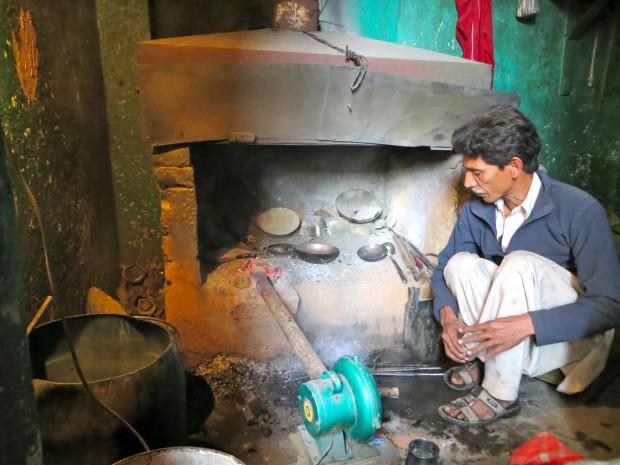Pakistani man turns dust into treasure
Afsiroon Naqas pulls a smoldering ball of mercury from a mixture he uses to extract gold dust from heaps of dirt he gathers from a market in Rawalpindi, Pakistan (Photo by Beenish Ahmed.)
At 6 a.m., the only thing can that can be heard in Sarafa Bazaar, the largest gold market in Rawalpindi, Pakistan, is the sound of bristles on pavement.
Afsiroon Naqas arrives in the labyrinthine market long before it fills with braying donkeys, rumbling rickshaws and men hawking everything from slices of coconut to lightbulbs.
On hands and knees, he painstakingly sweeps every inch of the street with an old shoe brush. But he and his young son Asad aren’t collecting trash. They’re looking for gold dust that blows out of the jewelry shops.
“Along these streets are teeny, tiny bits of gold,” said the gaunt 45-year-old, “Like dust or sand.”
Naqas makes a living separating the precious metal from heaps of dust. But he refuses to explain the process.
“If you want to know,” he said with a shy smile, “you’ll have to come to my shop at noon and I’ll show you.”
A dark, narrow staircase leads up to Naqas’ makeshift lab. It isn’t a “lab” in any serious way, but that doesn’t mean he isn’t working through some serious — and dangerous — chemical procedures.
His first task is to sift through the sediment he’s collected for rocks and other bits of debris.
Naqas then ladles up burbling acid from a white canister and pours it over the dirt.
Set over heat, the acid mixture coughs up a caustic cloud of mustard yellow smoke that soon turns emerald green and then a deep blue.
The blue smoke lets Naqas know that its time drop a glistening ball of mercury into the mix.
“All the other material is left outside,” he said. “The mercury holds in all the gold.”
It’s an ancient technique, really.
The only thing that’s left to do is push the silvery ball through some cheesecloth. With that, he’s left with a pea-sized ball of pure gold: the result of three days of sweeping and hours of extracting.
Naqas’ son, Asad, who’s about 10 years old, silently watches his father from the corner.
“I don’t let him sit next to me when I’m working with chemicals,” Afsiroon said. “I send him out. He’s a kid. He can’t handle the smoke.”
Naqas fully realizes that his business is a dangerous one, and he’d rather his son didn’t get involved.
“I’m stuck here because of some personal difficulties, and I’d prefer that my son not get trapped in this work. I think he’d be better off if he would study and eventually start a business or get a job. A lot of people have died from using these chemicals. The smoke makes you weak. It tears at your insides,” he said.
For now, Naqas accepts the hazards.
He hands the gold he’s collected to a dealer and earns what averages out to be about $8 a day. Naqas says the amount is barely enough to put food on the table and pay tuition for the three of his eight kids who are in school.
But the street alchemist doesn’t want to take up a different line of work. Sometimes, he says, he gets lucky and finds diamonds or even a whole ring. As wedding season comes to a peak across Pakistan, Naqas is hoping he’ll sweep up a small treasure.
We want to hear your feedback so we can keep improving our website, theworld.org. Please fill out this quick survey and let us know your thoughts (your answers will be anonymous). Thanks for your time!
